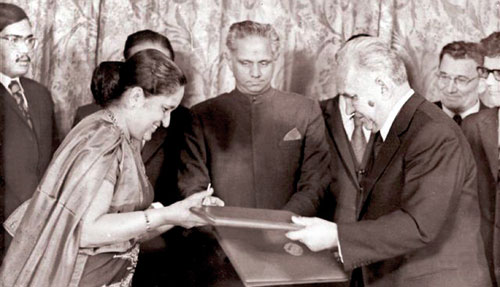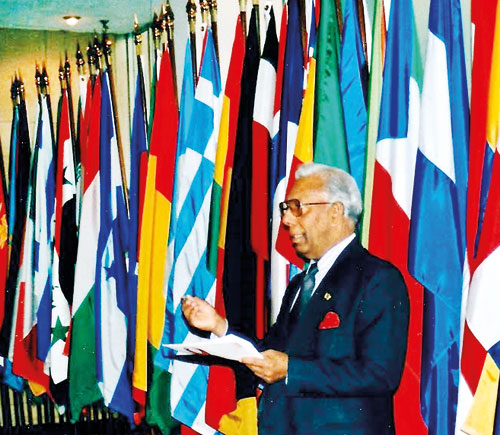Sunday Times 2
60 years of inexorable Sri Lanka-Russia relations
View(s):By Somar Wijayadasa
On February 19, 1957, Mr. S.W.R.D. Bandaranaike, the Prime Minister of Ceylon (later Sri Lanka) established diplomatic relations with the former Soviet Union, now Russia, thus beginning a significantly new era of diplomatic relations between the two nations.
But the long-winding history of our relationship is much older, dating back to 1891, when a Russian Consulate was established in Galle. It is also on record that, in 1891, the Russian Crown Prince (later Russian Emperor Nicholas II) planted a tree at a formal ceremony in the Peradeniya Botanical Gardens.

Mrs. Sirimavo Bandaranaike in Russia with Alexei Kosygin Premier of the Soviet Union
Since my student days in Moscow in the 1960s, I have had the rare privilege of witnessing the evolution of Lanka-Russia relations. Besides, as a frequent visitor to Russia, and a fervent observer of Russian foreign policy vis-a-vis Sri Lanka, I have seen the dramatic sea-change in the relationship between the two countries.
If diplomatic relations mean true respect, understanding of each other, and genuinely attempting to find mutually satisfactory solutions or courses of action, then the 60 year-relationship between Sri Lanka and Russia has been the epitome of true diplomacy.
Foreign policies of Sri Lanka and Russia
In 1957, Bandaranaike’s foreign policy based on the concept of non-alignment was attractive to the Russians. Later in 1960, when Mrs. Sirimavo Bandaranaike became the world’s first woman Prime Minister, she continued with the foreign policy of non-alignment giving impetus to the Non-Aligned Movement (NAM), the largest single political coalition outside the United Nations, currently numbering 120 non-aligned countries.
Since the disintegration of the Soviet Union in 1991, Russia, has undergone a metamorphosis moving from a totalitarian state to a truly democratic society. But it was President Mikhail Gorbachev’s new foreign policy thinking of the 1980’s which encompassed the principles of free choice, political and cultural pluralism, and supremacy of international law underlying international relations.
Russia’s significant foreign policy changes under Gorbachev were spelled out in my articles entitled “Changing a society that’s ripe for change” (Daily News, 9 March 1987), and also in “Sovereign right of nations to resolve their own problems,” (Daily News, 23 March 1989).
Since 2000, under the leadership of President Vladimir Putin, Russia’s ambitious diplomatic relations have grown into a more progressive system based on mutually beneficial economic cooperation.

Somar Wijayadasa speaking on World AIDS Day at the UN – 1998.
Catalyst for Russia’s foreign policy in Asia
It is natural for Russia (the world’s largest country with two thirds of its territory in Asia) to have a foreign policy with economically pragmatic and geo-strategic interests in the Asia-Pacific region – including Sri Lanka. Our history proves that the Portuguese, the Dutch and the British colonised Sri Lanka for 450 years not only to exploit our resources but also to make use of the island’s strategic location in the Indian Ocean.
Likewise, since our independence, all economic and military assistance and alliances from Western nations including the United States of America came with strings attached solely because of Sri Lanka’s geo-strategic significance. Make no mistake, China’s subtle interests – though beneficial to Sri Lanka – are no exception.
On the contrary, Lanka-Russia relations over the past 60 years prove that Russia’s genuine interests were primarily to expand economic ties, and improve bilateral relations. It is with that conviction that I wrote the feature articles “Sri Lanka and Russia have long history of congenial relations” (The Sunday Island, 17 March 2002), and “Lanka should strengthen ties with Sinhala speaking Russian Foreign Minister” (The Island, 25 March 2004).
In these articles, I highlighted the importance of holding various expos in Moscow to promote our culture, trade, tourism, gems, jewellery, etc., and emphasised that it would bode well for Sri Lanka to concentrate on mutually beneficial business relations with Russia.
Our Ambassadors’ remarkable service to Sri Lanka
Despite the significance of foreign policies or the popularity of leaders, it is incumbent on our ambassadors to collaborate with the host country to explore all possibilities and prospects of obtaining economic and technical assistance vitally needed for the development of our country.
It is perhaps with that premise in mind that, in 1957, Prime Minister Bandaranaike appointed Prof. Gunapala Malalasekara as our first Ambassador to the Soviet Union. He quickly developed a good relationship with Soviet Premier Nikita Khrushchev, and with Russia’s Foreign Ministry officials that paved way for the Soviet Union and Sri Lanka to enter into many bilateral agreements.
He was succeeded by veteran politician, Mr. T. B. Subasinghe (1961-1965) whose hospitable qualities were admired and adored by the Russians. It was during the years 1957 to 1965, the two countries entered into several bilateral agreements in the fields of economic and technical cooperation, education, culture, trade, and tourism, to name a few.
Under the Agreement on Economic and Technical Cooperation signed in 1958, the Soviet Union built the steel, tyre, and the flour milling factories. Also the agreement on housing construction, signed in 1963, paved way for the construction of the high-rise apartment buildings in Narahenpita.
In keeping with the trade agreement signed in 1958, we began to export tea, rubber, coconut oil and coir products to Russia. In return, we received heavy machinery equipment such as bulldozers, tractors, trippers, cranes, cement, and sugar, to name a few.
Among other noteworthy contributions to Sri Lanka are Russia’s assistance in the development of the Mahaweli and Udawalawe projects; long-term credit on favourable terms; the gift of the ship Samudradevi in 1976; significant military assistance; financial aid during humanitarian catastrophes like floods and tsunami; and the donation of a piece of land in Moscow to build a Buddhist temple.
Later, the two countries signed agreements on air transport (1964), aid and assistance (1965), marine fisheries (1971), and an agreement to assist each other in identifying, preventing and suppressing illicit drug trafficking; illegal economic and financial activities, and illegal immigration.
In 1976, the Soviet Government gifted to Sri Lanka the massive bronze statue of the late S.W.R.D. Bandaranaike that stands facing Galle Face Green.
Our world famous tea constitutes the major export item to Russia where it is popularly known as Ceylon tea. Russia imported 36.75 tons of tea in 2015, even though it imported 69.5 thousand tons in 2008.
Tourism is another promising area. Over the years, Sri Lanka has seen a significant growth of Russian tourists visiting Sri Lanka. According to available records, 63,648 Russian tourists visited Sri Lanka in 2015.
Among the landmark events between the two countries include the visit of Yuri Gagarin (the first man in outer space) to Sri Lanka in 1961, Prime Minister Sirimavo Bandaranaike’s visits to the USSR in 1963 and 1974, Russian Foreign Minister Sergey Lavrov’s visit to Colombo in 2009, and President Mahinda Rajapaksa’s visit to Moscow in February 2010.
Since I had the rare privilege of personally knowing all Sri Lankan ambassadors in Moscow, from 1962 to 1996, I must say – without prejudice to any – that our non-career ambassadors Malalasekera (1957-1961), Subasinghe (1961-1965), Neville Kanakaratne (1982-1987), and Nissanka Wijeratne (1991-1994) were highly respected by their Russian interlocutors, and thereby efficiently garnered much needed economic and technical aid for the development of Sri Lanka.
Since Russia always had a remarkable affinity towards the Bandaranaikes, Sri Lanka had a golden opportunity during Mrs. Chandrika Kumaratunga’s presidency (1994-2005) to expand our bilateral relations – but unfortunately nothing happened beyond the norm.
As the saying goes, it takes two to tango, and our successes in bilateral trade and economic cooperation are mostly thanks to the perseverance of Russian Ambassadors in Sri Lanka.
According to Ambassador Karchava, there are many Russian projects in the pipeline – including the possibilities for Russian company (Gazprom) to participate in gas exploration and modernisation of our oil refinery facilities, development of our fisheries industry and the construction of hotels and sea ports.
Our staunchest ally at UN forums
If “a friend in need is a friend indeed” then, Russia has passed the best test of friendship, particularly when Sri Lanka was threatened with terrorism and separatism by Tamil terrorists (LTTE) which the American FBI termed as the “the most dangerous and deadly extremists in the world.”
Russia has always been our staunchest and reliable ally – at various United Nations forums – during our 26-year long civil war with the Tamil terrorists which ended in 2009.
During the difficult war years, Russia not only helped our armed forces with Russian-made military equipment such as MiG-27 fighter planes, combat helicopters and T-54/55 battle tanks, etc., but also helped the Sri Lankan army with military training on battle field tactics.
Sri Lankans may never forget how the western powers intervened and interfered in our internal affairs during the civil war, and craftily manoeuvred several resolutions (including the War Crimes Bill) against the Government of Sri Lanka at the UN Human Rights Commission – charging that Sri Lanka’s Army shelling killed around 40,000 Tamil civilians in the final stages of the war.
In all those instances, Russia voted against those resolutions arguing that such U.N. resolutions would amount to interference in Sri Lanka’s internal affairs.
Russia’s prodigious gift of higher education to Sri Lanka
Russia’s magnanimous contribution to Sri Lanka, which no other country could ever match, is the thousands of fully paid graduate scholarships granted by the Soviet Government and later Russia to Sri Lankan students.
In the 1960’s, the newly independent countries needed qualified cadre to develop their national economies, raise their cultural levels and achieve social progress. Sri Lanka was no exception.
Though we received independence in 1948, university education was limited to a few from leading colleges in the country. Study abroad, mostly in England, was the prerogative of the wealthy few. And western universities gave only a few one-year scholarships such as Rhodes or Fulbright scholarships to a select few from developing countries.
In February 1960, Nikita Khrushchev opened the People’s Friendship University with the strategy to provide higher education in medicine, engineering and other sciences that were vital to develop the newly liberated nations in Asia, Africa and Latin America.
In 1960, about 30 students went to Moscow for higher studies, and gradually the numbers increased to more than 100 per year. Since then, 800 Sri Lankans have graduated from the Friendship University alone, and overall nearly 3,000 Sri Lankans have graduated from Universities in Russia and the former Soviet Union.
Its significance is inestimable considering the fact that the majority of these students came from Maha Vidyalayas in remote and far flung corners of Sri Lanka – a unique study abroad opportunity that bright kids from poor families could never dream of.
Coincidentally, it is also the 57th Anniversary of the Peoples Friendship University. A detailed chronicle of this university can be found in my article “Russia’s unprecedented gift of higher education to Sri Lanka” published in The Island (1.31.2015) to coincide with the 55th Anniversary of the Friendship University.
Judging by the invaluable contributions made by Russia – specifically towards our country’s economic, technological and educational progress – Sri Lanka-Russia relations stands as a historical chapter permanently cast in stone.
(The writer is a Moscow educated international lawyer who worked for the International Atomic Energy Agency, Food and Agriculture Organisation and UNESCO (1973-1984), was a UNESCO delegate to the UN General Assembly from 1985-1995, and was Representative of UNAIDS at the United Nations from 1995-2000.)

